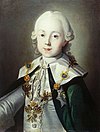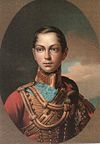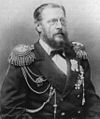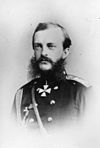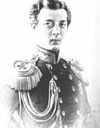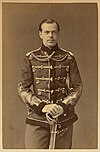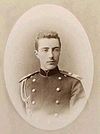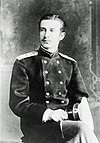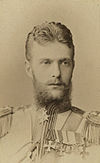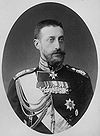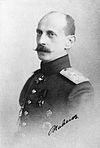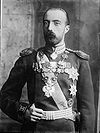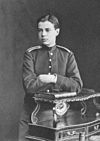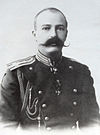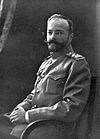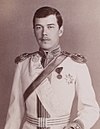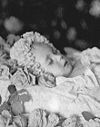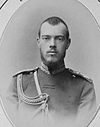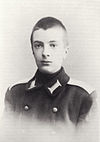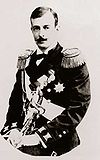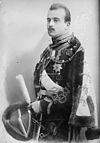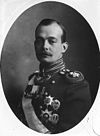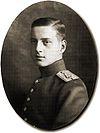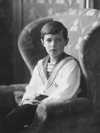List of grand dukes of Russia

This is a list of those members of the Russian Imperial Family who bore the title Velikiy Knjaz (usually translated into English as Grand Duke, but more accurately Grand Prince). This courtesy title was borne by the sons and male-line grandsons of the Emperors of Russia, along with the style of His Imperial Highness. They were not sovereigns, but members and dynasts of the House of the reigning Emperor.
For those Grand Dukes who were rulers of Russia, see List of Russian rulers.
The title Grand Prince is the English translation of the Russian Великий князь. The Slavic "knyaz" and the Baltic "kunigaitis" (both nowadays usually translated as Prince) is a cognate of King.
The title Grand Prince originated from 9th century when rulers of Kievan Rus' were so styled. In later medieval Russian states (the Rus') it already was used simultaneously by several rulers in the more expanded Rurikid dynasty and additionally by rulers of neighboring Lithuania (Gediminid dynasty).
The title velikiy knyaz continued as a courtesy title for all or several members of the dynasty, such as the Grand Duke of Russia during Russia's imperial era from the 17th century, although these Grand Princes were not sovereigns. For those Grand Dukes who were rulers of Russia, see List of Russian rulers.
Bearing the title Velikiy Kniaz originally had no specific rules: it traditionally belonged to all dynasts, and additionally, dynasts were created by the act of granting the title to some other heirs. Until the 19th century, the Russian Imperial House was usually in a precarious situation, having often no more than a couple of male dynasts, if even that many. The number to use the title was thus not abundant. Empress Elisabeth of Russia, after all male-line descent had been exhausted, made her sister's son, the future Peter III of Russia a dynast and a Grand Duke, although he was not of male-line descent.

After the births of the numerous sons of Nicholas I of Russia, the number of Grand Dukes increased into higher orders of magnitude. This afforded Russia a respite from earlier fragility that had plagued Russian succession, having led even as itself the country to instability. The right to the title was not traditionally limited, and in the 1880s (when there existed well over twenty male dynasts) Alexander III of Russia felt that their high number, if all allowed to use Grand Duke, diminished the prestige of the Imperial House and the weight of the title itself.

Alexander III formalized the use of titles in the Imperial House in 1886 (on 2 July 1886 Julian calendar, 14 July 1886 Gregorian) by such amendment to the succession laws. Grand Duke belonged henceforward only to sons and paternal grandsons of the Emperors of Russia, and Grand Duchess correspondingly only to daughters and paternal granddaughters, as well as to legitimate wives of Grand Dukes.
One male infant only 9 days old at the time of Alexander's edict thus lost the title. Those Russian dynasts who genealogically were distant from Emperors (as not to be Grand Dukes) were entitled to titulary Prince of Russia. Ioann Konstantinovich of Russia (1886–1918) was apparently the only who lost the grand ducal title accorded by convention at birth but removed by Alexander III. Alexander III's own grandchildren, children of his daughter Xenia Alexandrovna, were not yet born at the time of the edict, and accordingly became "only" Princes of Russia from their births, as they were great-grandchildren of Nicholas I (one generation too far) when looking at the male lineage.
The numbers began to decrease for other reasons too. In the last three decades before the revolution, only a couple of boys were born who were entitled to grand ducal title. After the revolution, particularly morganatic marriages axed numbers of dynasts to increasingly low numbers. Alexander III's edict has led to the situation where there is no longer any descendant to be uncontestedly entitled to grand ducal title.
Great Prince or Grand Prince would be a more accurate translation of this Russian title, but that term is neither standard nor widely used in English nor in French. In German, however, a Russian Grand Duke was known as a Großfürst, and in Latin as Magnus Princeps. "Grand Duke" is the traditional translation of the title Velikiy Kniaz in languages which do not have different words for prince as a substantive title and prince as a courtesy title. English and French are such languages.
Grand Dukes of Russia of the House of Romanov-Holstein-Gottorp
Amazingly enough, after 1918 no such boy was born into the deposed imperial house who would have been entitled to the title grand duke - i.e., had been a male-line grandson of a reigning emperor; although such would have been technically possible, as there lived sons of reigning emperors and their sons would have been so entitled.
Fictional Grand Dukes of Russia
- A Grand Duke Leonid of Russia appears in the Lucky Luke comic book Le Grand Duc (first published in 1973), by Morris and René Goscinny.
- A Grand Duke Alexei of Russia appears in the Sherlock Holmes short story The Adventure of the Seven Clocks, by Adrian Conan Doyle and John Dickson Carr.
About the Grand Duke of Russia in translated contexts
The title of sovereign Grand Duke and it as translation of Velikiy Knjaz have clearly different meanings. This occurs particularly in languages which do not have different words for prince (1) signifying the non-ruling relatives of a monarch, i.e. as a courtesy title, and (2) prince signifying a monarch (sovereign or like), i.e. as a substantive title, because there Grand Duke usually is (1) the established translation of the post-medieval courtesy title Velikiy Knjaz (literally: grand prince), and they are not sovereigns, but (2) several other post-medieval grand dukes are, being typically rulers of small states (such as Luxembourg). English and French use the title Grand Duke for both these purposes. In translations and such texts, (2) Grand Duke of Russia may also refer to some or all of the medieval reigning grand princes of the Kievan Rus' and its successor states.
Grand Duke is the usual and established translation in English and French of the Russian courtesy title Velikiy Knjaz (grand prince) of Russia, which from 17th century belonged to members of the family of the Russian tsar, although those Grand dukes were not sovereigns.
Note that a Grand Duke or Grand Duchess as a translation is thus not necessarily associated with a Grand Duchy; see the relevant articles for more information. These post-medieval Russian grand dukes are not associated with a grand duchy.
Any other translation of Velikiy Knjaz of Russia than Grand Duke is neither standard nor widely used in English nor in French. In German, however, a Russian Grand Duke is known as a Großfürst, and in Latin as Magnus Princeps.
A Russian Grand Duke or Grand Duchess was an Imperial Highness.
See also
- List of Grand Duchesses of Russia
- See Line of succession to the Russian throne for post-revolutionary claimants to the title of Grand Duke


